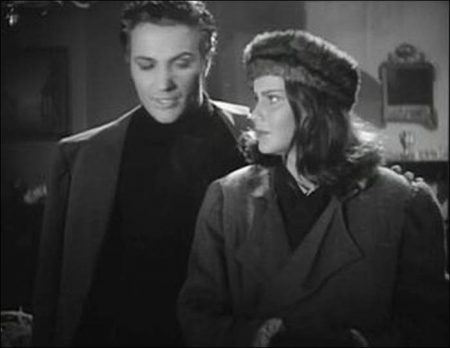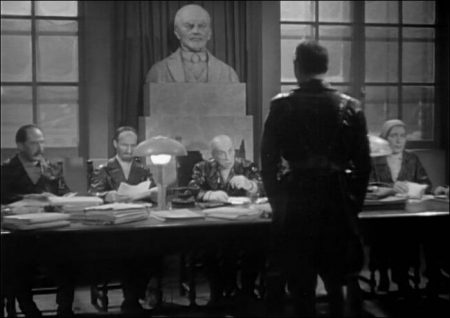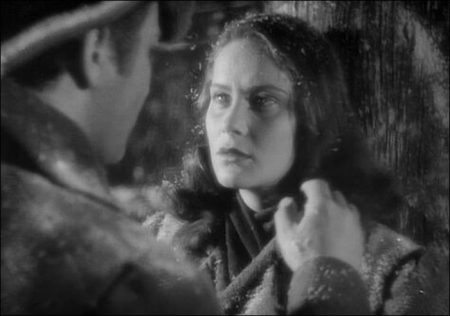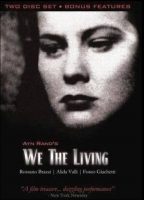We the Living movie storyline. The time is the Russian Revolution. The place is a country burdened with fear – the midnight knock at the door, the bread hidden against famine, the haunted eyes of the fleeing, the grublike fat of the appeasers and oppressors. In a bitter struggle of the individual against the collective, three people stand forth with the mark of the unconquered in their bearing: Kira, who wants to be a builder, and the two men who love her – Leo, an aristocrat, and Andrei, a Communist.
In their tensely dramatic story, Ayn Rand shows what the theories of Communism mean in practice. We the Living is not a story of politics but of the men and women who have to struggle for existence behind the Red banners and slogans. It is a picture of what dictatorship – of any kind – does to human beings, what kind of men are able to survive, and which of them remain as the ultimate winners. What happens to the defiant ones? What happens to those who succumb? Who are the winners in this conflict? Against a vivid panorama of political revolution and personal revolt, Ayn Rand offers an answer that challenges the modern conscience.
We the Living is the story of beautiful, strong-willed Kira Argounova (Alida Valli). The time is the Russian Revolution. The place is a country burdened with fear – the midnight knock at the door, the bread hidden against famine, the haunted eyes of the fleeing, the grublike fat of the appeasers and oppressors. In a bitter struggle of the individual against the collective, three people stand forth with the mark of the unconquered in their bearing: Kira, who wants to be a builder, and the two men who love her – Leo, an aristocrat, and Andrei, a Communist.
In their tensely dramatic story, Ayn Rand shows what the theories of Communism mean in practice. We the Living is not a story of politics but of the men and women who have to struggle for existence behind the Red banners and slogans. It is a picture of what dictatorship – of any kind – does to human beings, what kind of men are able to survive, and which of them remain as the ultimate winners. What happens to the defiant ones? What happens to those who succumb? Who are the winners in this conflict? Against a vivid panorama of political revolution and personal revolt, Ayn Rand offers an answer that challenges the modern conscience.
We the Living is a two-part 1942 Italian romantic war drama film, based on Ayn Rand’s 1936 novel of the same name. It was originally released as two films, Noi vivi (literally “We Live”) and Addio Kira (“Goodbye Kira”). It was directed by Goffredo Alessandrini and produced by Scalera Film, and stars Alida Valli as Kira Argounova, Rossano Brazzi as Leo Kovalensky, and Fosco Giachetti as Andrei Taganov.
The nominally anti-communist, but de facto anti-authoritarian film was made and released in Italy during World War II, then subsequently banned by the Fascist government and pulled from theaters. The film was lost and forgotten for decades, then found and restored with Rand’s involvement. It was released for the first time in the United States in 1986.
On September 14, 1942, the Italian film version of Ayn Rand’s We the Living premiered at the Venice Film Festival. When the movie opened in Rome, it was a box-office success. The portrayal of an intelligent, sexually independent heroine was viewed as controversial. Shortly after its theatrical release, the Italian Government banned the film for reasons mentioned below.
About the Storyline
It is the early 1920s and Kira’s family is gradually learning to cope with Russia’s sweeping social and ideological changes in the wake of the Revolution. However, 18 year-old Kira, whose goal is to become an engineer, loathes the new order and openly defies those who pressure her to conform
Kira encounters a young fugitive, Leo Kovalensky, (Rossano Brazzi), who is hiding from the GPU—the secret police. Unknown to her family or friends, Kira meets secretly with Leo and they soon fall in love.
Following a close call with the GPU, the two lovers attempt to escape Russia on a smuggler’s ship. They are caught and Leo is taken away. Kira learns from a GPU officer that Leo is the son of a former aristocrat, an admiral who was executed for fighting against the Communists.
The sympathetic officer takes a liking to Kira and secures Leo’s release. Leo moves into a small apartment that was sectioned out of his father’s former mansion. Kira, defying family and convention, moves in with him. Kira meets Andrei Taganov (Fosco Giachetti), a top GPU official and idealistic Communist, and after an initial clash of ideologies, a mutual respect forms between the two. Unable to find any work other than hard, manual labor, Leo’s health deteriorates.
Kira learns that Leo has developed tuberculosis and must be sent to a sanatorium for treatment. She tries desperately to get him accepted in a state-run institution, but officials refuse to help someone with Leo’s upper-class background. Her last hope is an expensive private sanatorium. Kira must somehow find the money or Leo will die.
In an agonized confession, Andrei reveals that he has fallen in love with Kira. Seeing a way to save Leo, Kira pretends to return Andrei’s love. Kira uses Andrei’s generous gifts to get Leo into a private sanatorium in Crimea. Leo departs, never suspecting that Kira is having an affair in order to save his life.
Months later Leo returns, his health restored, but his spirit turned cynical. Despite Kira’s pleas, Leo gets deeply involved in a dangerous black market venture. Andrei’s love for Kira deepens and he begins to question the ideals of his party. Unaware of Kira’s relationship with Leo, Andrei urges Kira to escape with him to the West-an idea that was once contrary to everything he believed in. Kira turns him down.
Andrei learns that high ranking Communist party members are behind Leo’s black market venture. Any revolutionary idealism he still has left is destroyed when Andrei reports his findings to the party bosses and they order him to arrest only one man: Leo.
The dramatic climax of We the Living comes when Andrei arrives at Leo’s home to arrest him. Andrei discovers a closet full of Kira’s clothes, revealing what he assumes is her infidelity. As Leo is taken away to prison, Kira arrives home and finds herself alone with the enraged Andrei. But it is Kira who unleashes her fury at Andrei for being part of a system that forced her and Leo into a desperate struggle for their lives.
Andrei’s once-proud purpose in life is now utterly shattered, yet his worship of Kira is restored. In full knowledge of the consequences, he arranges to have Leo set free and, confronting his former comrades, he bitterly denounces the system he had long fought for.
Andrei returns to his flat and the realization that he devoted his life to a corrupt cause is crushing. He takes his own life. Leo, home from prison, confronts Kira over her affair with Andrei and announces that he is leaving her forever. Kira, realizing that Leo’s spirit has been forever crushed out of him, chooses not to reveal the real purpose behind her relationship with Andrei.
Still undefeated, Kira vows to escape Russia, this time alone, on foot, across a wilderness border. She knows there is little chance she will survive, but the alternative is never to know freedom. Before leaving, Kira pauses at the deserted garden, remembering bittersweetly her first meeting with Leo, and then disappears into the night.
We the Living (1942)
Directed by: Goffredo Alessandrini
Starring: Fosco Giachetti, Alida Valli, Rossano Brazzi, Giovanni Grasso, Emilio Cigoli, Annibale Betrone, Elvira Betrone, Gioia Collei, Bianca Doria, Cesarina Gheraldi, Silvia Manto
Screenplay by: Anton Giulio Majano (Based on the Ayn Rand novel)
Production Design by: Giorgio Abkhasi, Andrea Belobodoroff
Cinematography by: Giuseppe Caracciolo
Film Editing by: Eraldo Da Roma, Duncan Scott
Costume Design by: Rosi Gori
Art Direction by: Amleto Bonetti
Music by: Renzo Rossellini
MPAA Rating: None.
Distributed by: Angelika Films (United States), Scalera Film (Italy)
Release Date: October 20, 1942 (Italy), November 25, 1988 (New York City, United States)
Views: 472











